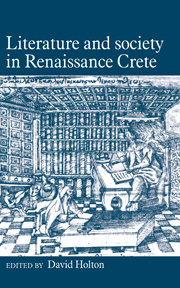Book contents
3 - Literary antecedents
Published online by Cambridge University Press: 14 October 2009
Summary
Venice has been called the ‘hinge’ of Europe (McNeill 1974), the place where East and West met, a trade centre with a strongly international orientation, but also, from a cultural point of view, an intermediary between the worlds of West and East, and especially the Greek East.
From the end of the fourteenth century onwards Greek scholars, fleeing from the Byzantine Empire threatened by the Ottoman Turks, took refuge in Venice. In their wake came the manuscripts, texts and copyists which the dawning Renaissance required; at a later stage, other scholars and educated people, attracted by the demands of the Venetian printers, arrived to offer their services as translators of classical Greek texts, editors, correctors, printers and compositors. On the other hand many humanists travelled to the Greek world; the Venetian colony of Crete had a constant demand for civil servants, teachers, doctors, scholars, bishops, abbots and conventuals, as well as singers and poets to entertain them, and of course all of these brought with them the manuscripts and books they needed. At a certain moment the products of the Venetian printers, especially liturgical and religious editions and literary texts in the vernacular, but also the classics, began to flood the Greek market.
- Type
- Chapter
- Information
- Literature and Society in Renaissance Crete , pp. 49 - 78Publisher: Cambridge University PressPrint publication year: 1991
- 4
- Cited by



